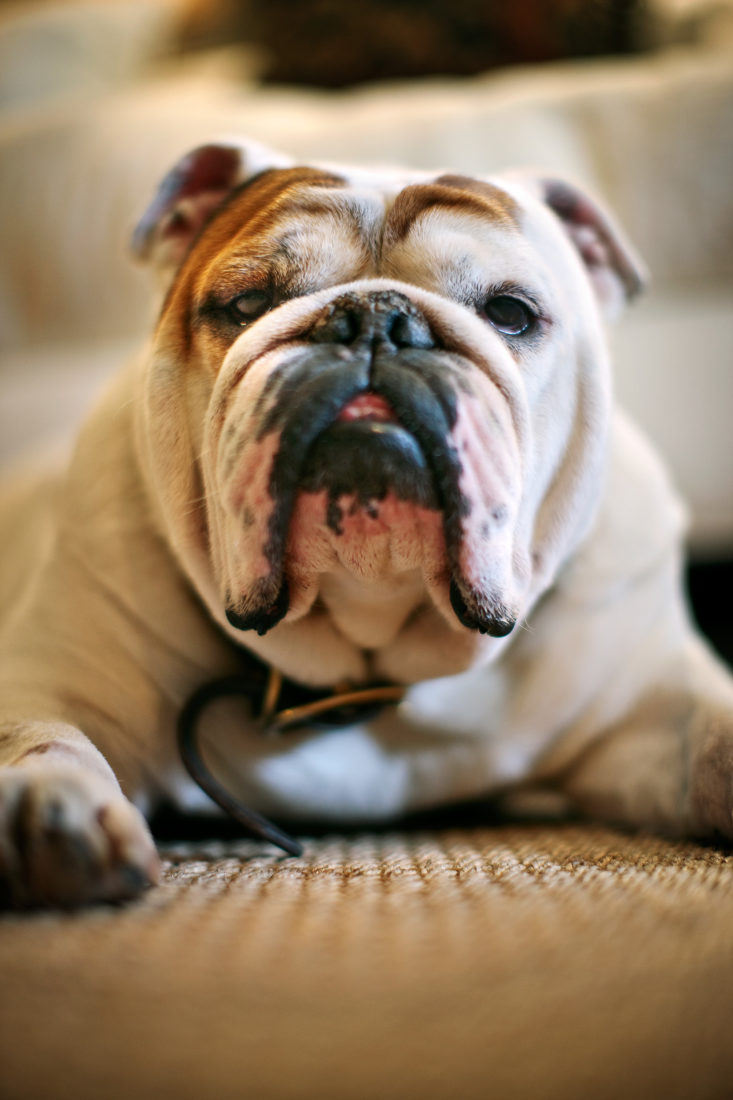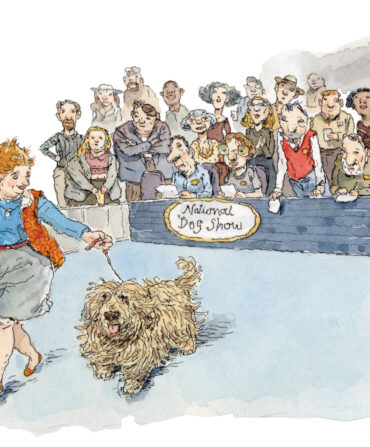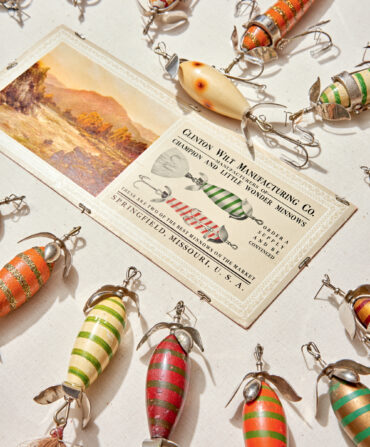I never wanted a dog. I preferred cats. But it was Christmas and he was a gift and I didn’t know how to tell her I couldn’t take him. She said the breeder was a lady in town. There’d been an ad in the paper: English bulldogs, sired by a champion, $450 each. She’d picked out the best one. “How much did you say he cost?” I had a hard time keeping my voice from shaking. She didn’t ask me to reimburse her, but I wrote out a check anyway. We were both so poor it didn’t make any sense.
I named him Emmett. That first night together, I put him in a cardboard box with a blanket on the bottom. He cried so much I had to take him to bed with me. “You miss your mama?” I said. “Is that what has you so upset?”
I held him against my chest and let him hear my heart beat, and he calmed down after a while. He slobbered, though, and drool got on my sheets and glued my fingers together. He tried to suck one of my nipples and I had to push him away. When he finally went to sleep, he snored like an old man with a deviated septum. Even worse was his intestinal distress. It got so bad I had to get up and go outside for some air.
I noticed how he’d whine and paw at his ear, and how he’d give you a look if you tried to pet the top of his head, so I took him to the vet. The man tried to be gentle about it. Emmett had a bad ear infection, he said. His tubes were blocked and forming scars. “Your dog’s deaf,” he said. “But it’s not just that. If we don’t stop the infection, it’s eventually going to kill him.”
“Give him some medicine,” I said.
“I will, but he needs surgery, and not the kind I’d attempt here.”
I took him to the LSU vet school in Baton Rouge. When it was over, they carried him out to me wearing a big halo fitted around his neck. It kept him from scratching his ears. He was so excited to see me he peed on my pants and best Sunday shoes. I didn’t have enough money to pay the bill. I had to use one of those cash-advance checks a credit card company had sent me in the mail.
It’s hard enough to communicate with a dog that can hear. Imagine what it was like trying to train Emmett. You could clap your hands together in front of his face and he wouldn’t flinch, but I worked with him, I worked hard, and over time he started to obey sign language. If I caught him drinking water from the toilet, for instance, all I had to do was stomp on the floor and point at the door to get him to stop and leave the room.
You could bathe him in the morning with the garden hose and some baby shampoo and by noon he smelled bad again. You could freshen up his water bowl three times a day and he was still going to leave ropes of saliva on the furniture. He’d break wind at the wrong time, too, like when you were just sitting down to supper. And if you had guests over, you could count on him humping their legs. He’d hop right on up there and go to town, a look on his face that let you know he was in the murderous grip of something that even he did not understand.
I knew he needed a girlfriend, so I called around to see if anybody had a female bulldog they wanted to breed. After a few weeks a man showed up with a girl dog chained to the back of his pickup. “You got your papers?” I said to the man. He didn’t say anything; he just looked at me. “Emmett’s registered with the American Kennel Club. I’m sorry for the misunderstanding.”
“You think he’s too good for Madonna?”
“No sir,” I answered. “Bring her on back.”
When they were finished, Emmett slept for two days. I wondered if he’d slipped into a coma. He’d given his best effort and made me proud, but I was even more impressed when, nine weeks later, Madonna delivered a litter of eleven puppies, nearly double the average for the breed. To celebrate, I grilled a couple of rib-eye steaks and fed one of them to Emmett. They were discounted manager’s specials, a few days past their expiration date and turning color, but Emmett didn’t complain. I popped a beer open and poured it in his bowl; then I had one myself.
On weekends we often went for drives in my truck. Most days we traveled the country roads, but other times we visited the French Quarter in New Orleans. If it wasn’t too hot outside, I put him in the bed and let him feel the wind. He liked to perch himself on the wheel well and have a look at all the people on the sidewalks. They’d run over and pat the top of his head, his little bun-shaped tail shaking. Tourists fed him Lucky Dogs, beignets, and jambalaya. They let him sip from their go cups. The strippers and transvestites on Bourbon Street, the art dealers and antiquarians on Royal and Chartres. It seemed everybody had to run out and say hello.
I was often mad at him for one disappointment or another, like the time he ate a frog, came in the house and threw it up on the carpet. But I can also tell you there were days when it seemed he was the only friend I had in the world. I’d sit on the back stoop and read my bad reviews to him. A hurricane hit the town and I sat holding him close in the bathtub, waiting for the walls to blow away. When my girlfriend and I were fighting, I’d take his face in my hands and whisper in his dead ears about how I had him and didn’t need a woman anyway. “You’re lucky you found me,” I told him, even though I knew that I was really the one who had it good.
He died on Thanksgiving Day, 1995, after a family dinner at my mother’s house. He was only six years old. He’d been sleeping longer than usual and I went to wake him up. I gave him a shake and said, “Let’s go, you randy, foul-smelling beast,” but he was cold, his body rigid. His chin rested between his front paws, and his eyes were closed. We figured he must’ve had a heart attack in his sleep after eating turkey and cornbread dressing with us, and after playing for hours with my nieces and nephews, who’d pretended he was a horse and taken turns riding on his back. “Emmett,” I ran into the house screaming. “He’s dead. Emmett’s dead.”
When things settled down, my brother and I went to the shed and came out with shovels. There was a grassy place on the side of the house where we’d buried our childhood pets. This was where we put him.
“Why don’t you get another one?” people asked me.
“You know why,” I answered.
About ten years ago a friend called and told me she had something in her office that I needed to see. This friend is a professional art conservator; she repairs damaged paintings and pottery for a living. A client had bought a large ceramic bulldog at an auction, but the rare life-size antique, made in France in the 1890s, had been damaged in shipping. The client had filed a claim with her insurance company, and now the company’s adjuster wanted to sell the dog.
“It looks just like Emmett,” I told her when I arrived at her studio.
“You want to take him home with you?”
I keep him in a spot next to my favorite chair in the living room. I pat him on the head every time the doorbell rings and I go to answer it. As much as I enjoy owning the dog, I’ve never for a minute been fooled into believing he was Emmett. He doesn’t place his paws on the top of my feet when he wants my attention, and he’s never once licked me so much that I’ve needed a shower.
I still prefer cats, yet I dream about Emmett. He’s outside barking at a squirrel even though I moved from that house fifteen years ago. I hear him snoring in the other room and when I go there the room is empty.
It’s hard, all right. But I suppose that’s what you get for loving somebody.








